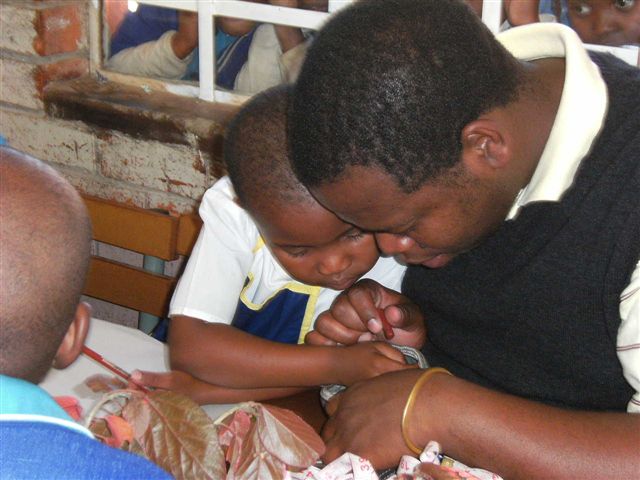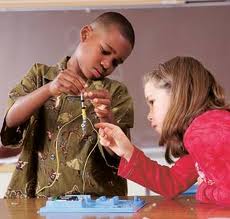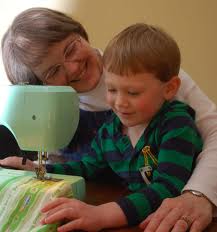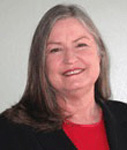
Core is about families learning together
An interesting letter was posted on a home school group that I visit regularly, TJED Muse. Donna Goff made a reply that I think has merit and can be of assistance to any modern day parent. She has graciously given me permission to share it with you. I hope that you enjoy her comments as I did.
Core Phase and Family Culture
In an email to the group you said, “Yesterday, my husband basically told me that he thinks the kids should be in school.”
You also said, “But I need ideas about how to help myself, my husband, and my kids be inspired once again. The ages of my kids are 9 boy, 7 girl, and 3 boy.”
So I am responding. I do not wish to offend, yet sometimes when I respond and share, it can put people on the defensive.
You also said, “We do opening exercises every morning, but then it’s on to getting math and writing done so we can have free time.

Kids with a solid core phase transition to love of learning
After reading the rest of the post it looks like the core of the issue is the need to revisit the core phase. Most boys (about 60%+) tend to slide into core phase after girls by a year or two. Kids with a solid core phase transition into love of learning.
If these are the issues, then school is not likely to rectify them, because these other issues will still undermine their progress at school:
* The father’s example and computer distractions- “My husband also acknowledges that he has been part of the problem….He’s on the computer a lot…programming for fun…at least he’s not a gamer. But the kids see that the computer is the place to be.”
* An over Busy mom, leaving little time for education and lack of structure. – “I have been more than busy this fall, and am ashamed to say that the education of the children has been sorely lacking.” “I am taking steps to simplify my life so that I can be a better educator and mom.” “And I haven’t been as diligent as I need to be in structuring enough time for their education or mine.”
All of these issues are core phase issues and deal with family culture. One needs to take an inventory of where they are, envision where they want to be, and look at what family ways and traditions will provide fertile soil for this to grow, fruit, and develop.
What is core phase?
I think that too often people over intellectualize core phase; meaning they think if they can describe it, they have it, or they think because they read scriptures they have their core. In DeMille’s TJEd book he writes about where we start. We start with ourselves and our core book. We drink from it everyday. We align our lives with it. We use it to measure truth. We teach it to our children. If we are not living what we proclaim, our children see the dichotomy and know we talk the talk and do not walk the walk. We must start with ourselves. We need to also work on improving our marriage. A house divided is not likely to stand.
Quite frankly, if they know, but do not do, they really do not know. Core phase is where our core values and relationships with God, family, and society are formed. The curriculum is work, play, and worship together. Core phase is an action phase. It is where they learn consistency through daily family work and family routines.

The curriculum is work, play, and worship together.
Core Phase is about Family
Core phase is not about assignments, it is not about chores, it is not about independent child routines. It is about family. When a couple marries they set up routines, whether or not children enter the picture. As each child comes along they are integrated into those routines, they work and play along side their parents. This way the parents can teach by precept and example. They can take advantage of teaching moments; they build relationships, and pass on values.
When a child does chores they are isolated from the parent and siblings. Teaching moments are missed. Many opportunities to ask questions and build trust are lost. Key values and weightier matters are less likely to be passed on. When a child works side by side with an adult they see their worth and value as a needed part of the team.
An adult does a task to finish it and to do it well. When a child works with the adult they develop the habit and discipline of finishing quality work. This is where character and work ethic are forged. As they grow they want to demonstrate they are growing and they step out and show they can do an adult job. Meanwhile, as they play imaginatively you will see they are practicing being adults in many ways.

When a child works with the adult they develop the habit and discipline of finishing quality work.
Work, play, and family worship are the vital curriculum of the core phase.
That said what about reading, writing, and arithmetic?

When a child works with the adult they develop the habit and discipline of finishing quality work.
How does a child learn to read in core phase? A child that lap reads the scriptures with their parents will most likely learn to read and also they are more likely to value the scriptures. A child who is read to from both good classic children’s fiction and non fiction sources is more likely to develop a large vocabulary and gain a broad base of knowledge.
How does a child learn to write in core phase? If the family begins journaling, keeping lists, writing letters, the children will most likely learn to write, view writing as a tool that helps them and is important. In our stocking stuffers each year our children get a ream of white paper and a new journal.
How does a child learn arithmetic in core phase? Engage your children in cooking, doubling recipes, learning to sew, measuring, reading weather thermometers and recording the temperature, taking nature walks, being inquisitive. Start a “Tinder Binder” and write down questions that come up and things of interest that come up while reading or discussing the news. Take kids grocery shopping; I call it living math. I explain why I feel a certain product meets our needs and is the best price for us and why. They will learn to think.
Foundational Tools of Learning:
Gaining the foundational tools of learning need not be so academic–“Now we will spend 10 minutes learning math.” These tools are natural to obtain, lessons can come later. After all, they learned to talk without having grammar lessons.
Take some wild days and crazy days; go to the zoo, a museum, or nature preserve. Help them keep a binder and scrap book these outings. Write what they want written until they can write for themselves. Do not push. Do not complain. Keep your own!
My first round of homeschooling was back in the 1980s in Colorado. My kids were young. We moved to Loveland from Denver. My husband had a job with a major computer company. We put our kids back in school when we moved because the principal made promises to us. He did not keep those promises and our kids were back home within a month. Unfortunately we got a new TV and a computer. They became major distractions. Because our kids were distracted my husband put them back in school. It solved nothing and made more challenges for me. We moved to Utah and I began homeschooling again. I learned that the problems were not solved by putting kids in school.
I have since learned that the same things that make for a successful home school are the same things that make for a successful public or private school experience. It is not the place where the academics take place that makes the most difference. Conversely, the same things that undermine home school undermine learning elsewhere. The key is the home culture and the very core!
God bless.
Mahalo,
Donna

Donna Goff
Donna Goff lives in Utah with her husband Roger and their two youngest children. Donna was born in the Midwest and raised in Hawaii. She and her husband are parents of four sons and three daughters 13-33. She is grandmother of two granddaughters and seven grandsons, one grandson on the way all under eight! She has home educated her children since the early 1980s, and been doing TJEd since 1995.
Donna earned her BA in Fine Art and Design from Brigham Young University ‘80, 5 Pillar Certification ‘06, and MA Ed. George Wythe University ‘08, Cum Laude. Donna has been a keynote speaker and has presented at dozens of conferences in California, Nevada, Utah and Virginia, since 1995. She created Mentoring Our Own TJEd Yahoo Group in 2002. She founded Moor House Academy, a TJEd private cyber-school and cottage school / home education hybrid in 2002. Donna and her daughters co-founded The Princess Academies in 2009, an organization for mothers and daughters promoting a whole education for girls. Donna loves to be a wife and mother; she also loves to learn, create, provident living, gardening, hiking, stained glass murals, sharing, being a frugalite and life!
Possibly Related Posts:
- Why take Your Kids Camping?
- Top 10 Educational Apps for Kids
- Homeschooling Students With Dyslexia
- FOUR Outdoor Science Lessons for Warmer Weather
- 5 Creative Writing Exercises for Kids of All Ages



{ 2 comments… read them below or add one }
Donna,
Thank you so much for this post! I am just drinking up anything I can find about homeschooling and have learned a ton from your site.
Hi Jenny, I am glad that you are getting some good information. Donna is amazing and I appreciate her sharing here. You are going to do a wonderful job!